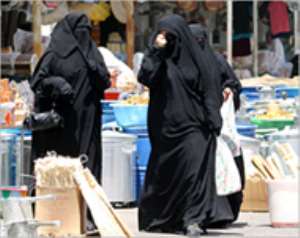
Attempts to stop a rise in obesity among Saudi Arabian women are being hampered by wealth and conservative values, health officials say.
Up to two-thirds of Saudi women are too fat and need to exercise, but many are influenced by the country's religious leaders and Islamic scholars who argue against it.
In the Saudi capital, Riyadh, hotel gyms and pools are off limits to women.
Along the city's walking trails, where the women walk covered in their mandatory black cloaks, they are sometimes harassed by the religious police, known as muttawa.
One woman walker, Rana al-Abdullah, said the muttawa ordered her to go back to her car when she was out walking and would not leave her alone until she complied.
She now walks in shopping centres.
Changing attitudes
Many Saudis say they are baffled by the religious arguments.
At a clinic treating obesity-related diseases, a booklet left by a writer named Muhammad al-Habdan said that if girls' schools began physical education the pupils would have to change into workout gear - and good girls should not disrobe outside their homes.
"There is no faster way to corrupt nations than the emancipation of women - that is getting her out on the street to entice men and ruin their morals," he writes.
Changing in a locker room might cause them to lose the shyness that is the hallmark of good morals and girls might become attracted to each other after seeing their classmates in tight leotards and tops, he says.
Changing such attitudes has become the goal of many health-conscious women alarmed about the rising rate of obesity in their country.
It is not just women - about 52% of Saudi Arabia's men are either obese or overweight, according to Saudi press reports.
Health officials blame the plush, oil-fuelled Saudi lifestyle for the expanding waistlines.
As Saudis have become richer, they have abandoned fibre-rich meals for fast food. They have brought in millions of Asian workers to do manual jobs and they are addicted to technology that encourages staying at home in front of a computer or the television.
"We're a very affluent society, so we have the luxury not to have to move," said Yasmin al-Tuwaijri, an epidemiologist who studies the obesity epidemic at a leading Riyadh hospital.
Government efforts
Aware of the problem, the government is trying to educate its citizens about obesity and the diseases related to it.
Saudi newspapers, which are government-guided, carry tips almost daily on healthy eating and exercise.
The health ministry and a women's charity, Al-Nahda Philanthropic Society for Women, are spearheading campaigns to encourage Saudis to start moving.
Yet the efforts are not making Saudis leaner.
"It's because the whole environment doesn't support a change in lifestyle," said al-Tuwaijri.
Importance of exercise
Several years ago some members of the appointed consultative council, the closest thing Saudi Arabia has to a parliament, raised the issue of physical education in girls' schools.
Those who voted against it pointed out that exercise classes in boys' schools have not had much effect on male obesity, according to press reports. That is the same argument al-Habdan makes in his booklets.
Badria al-Bani, a member of the walking campaign al-Nahda is spearheading, said the group's effort will focus on raising awareness among Saudi men of the importance of exercise in a woman's life.
It will also suggest that girls' schools dedicate 15 minutes of the lunch break to walking.
"Isn't walking better for the girls than eating?" she says.




 Former Kotoko Player George Asare elected SRC President at PUG Law Faculty
Former Kotoko Player George Asare elected SRC President at PUG Law Faculty
 2024 elections: Consider ‘dumsor’ when casting your votes; NPP deserves less — P...
2024 elections: Consider ‘dumsor’ when casting your votes; NPP deserves less — P...
 You have no grounds to call Mahama incompetent; you’ve failed — Prof. Marfo blas...
You have no grounds to call Mahama incompetent; you’ve failed — Prof. Marfo blas...
 2024 elections: NPP creates better policies for people like us; we’ll vote for B...
2024 elections: NPP creates better policies for people like us; we’ll vote for B...
 Don’t exchange your life for wealth; a sparkle of fire can be your end — Gender ...
Don’t exchange your life for wealth; a sparkle of fire can be your end — Gender ...
 Ghana’s newly installed Poland train reportedly involved in accident while on a ...
Ghana’s newly installed Poland train reportedly involved in accident while on a ...
 Chieftaincy disputes: Government imposes 4pm to 7am curfew on Sampa township
Chieftaincy disputes: Government imposes 4pm to 7am curfew on Sampa township
 Franklin Cudjoe fumes at unaccountable wasteful executive living large at the ex...
Franklin Cudjoe fumes at unaccountable wasteful executive living large at the ex...
 I'll 'stoop too low' for votes; I'm never moved by your propaganda — Oquaye Jnr ...
I'll 'stoop too low' for votes; I'm never moved by your propaganda — Oquaye Jnr ...
 Kumasi Thermal Plant commissioning: I pray God opens the eyes of leaders who don...
Kumasi Thermal Plant commissioning: I pray God opens the eyes of leaders who don...
